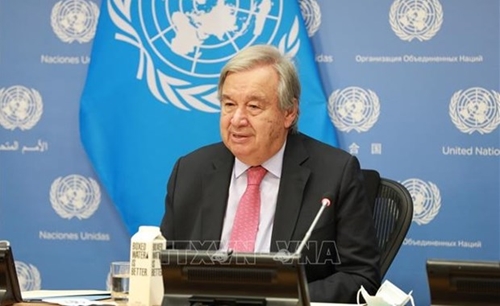The visit, as affirmed by the U.N. Secretary General, demonstrates the importance the U.N. attaches to its partnership with Vietnam over the past 45 years, and that Vietnam is an indispensable member of the U.N., which has been significantly contributing to U.N. efforts in addressing global challenges, for peace and development in the world.
Guterres also stressed that Vietnam has always been a strong partner of the U.N. since its admission in 1977.
    |
 |
|
United Nations Secretary-General António Guterres |
Only four days after the first session of the U.N. General Assembly on January 14, 1946, President Ho Chi Minh filed a dossier, seeking the U.N. membership for Vietnam. The Southeast Asian nation officially joined the U.N. 31 years later.
On September 21, 1977, the New York Times ran an article titled “Vietnam is admitted to the U.N. as 32nd General Assembly opens,” saying “the resounding applause that rang through the Assembly Hall and the chorus of speeches that followed, all were felt to be a reflection of the sentiment of the overwhelming majority of members that Vietnam was owed special recognition on this day, in part because its entry was overdue.”
The U.N. membership helped Vietnam receive support in national reconstruction and win recognition as a unified, independent and peaceful nation.
The 32nd General Assembly also adopted Resolution 32/2 calling on countries and international organizations to assist Vietnam in post-war reconstruction. Although Vietnam officially joined the U.N. in 1977, a number of international organizations had provided aid for the country since 1975.
Thanks to the support of U.N. agencies and organizations, Vietnam has utilized external resources, together with its internal resources, to transform from a poor, backward country after wars to become a middle-income nation, towards a developing one with modern industry and upper middle income by 2030, and high-income developed country by 2045.
Over the past 45 years, the relationship between Vietnam and the U.N. has become an example of development cooperation, which has been recognized and commended by the international community.
Vietnam has approved country programs with the U.N. Development Program (UNDP), the U.N. Population Fund (UNFPA) and the U.N. Children’s Fund (UNICEF) for 2022-2026, and the Vietnam-U.N. cooperation framework for sustainable development for the same period.
Under the framework, the U.N. will help the Vietnamese Government implement the socio-economic development plan for 2021-2025 and Sustainable Development Goals.
It covers inclusive social development, climate change response, disaster resilience and environmental sustainability, shared prosperity through economic transformation, and governance and access to justice.
Its total funding amounts to over 542 million USD, with more than 293 million USD available and some 248 million USD to be mobilized.
At the 26th United Nations Climate Change Conference of the Parties (COP26) in the U.K. last year, Vietnam fully participated in important multilateral initiatives. Notably, Prime Minister Pham Minh Chinh made commitments to net carbon emissions by 2050, and joined the Global Methane Pledge, the Glasgow Declaration on forests and land use, the Global Coal to Clean Power Transition Statement, and the Adaptation Action Coalition.
During the COVID-19 pandemic combat, Vietnam received more than 61.7 million doses of vaccines through the U.N.-backed COVAX Facility, and medical equipment valued at 45 million USD from U.N. organizations.
U.N. organizations in Vietnam, especially the World Health Organization (WHO), have supported Vietnam in public health emergency preparedness, risk surveillance and assessment, disease investigation and response, laboratory, infection control and prevention, clinical management, and risk communication.
For its part, Vietnam has continued to join U.N. efforts in addressing issues regarding regional and international peace and security, and human rights. The country actively engaged in the negotiations and signing of The Treaty on the Prohibition of Nuclear Weapons in 2018, and was the 10th country to ratify the treaty.
Vietnam has also dispatched 493 officers to U.N. peacekeeping missions in South Sudan, the Central African Republic and the Department of Peace Operations at the U.N. headquarters.
The country has deployed four rotations of Level-2 Field Hospital to South Sudan and an engineering company to Abyei. Vietnam is one of the countries sending the most female officers to the U.N. peacekeeping missions.
Vietnam was elected as a non-permanent member of the U.N. Security Council for 2020-2021, securing 192 out of 193 votes, and outstandingly performed the role in this position.
The country has worked to promote ASEAN’s role in the council’s activities, actively cooperated with U.N. mechanisms on human rights, and launched reports on the implementation of the Universal Periodic Review (UPR) as well as international conventions on human rights to which it is a member.
Vietnam has assumed different important positions in U.N. agencies, including the Postal Operations Council (POC) of the Universal Postal Union (UPU) for 2022-2025, and the International Atomic Energy Agency (IAEA) Board of Governors for 2021-2023, among others. Most recently, Vietnam was elected to the U.N. Human Rights Council for the 2023-2025 tenure on October 11 at the 77th session of the U.N. General Assembly in New York.
In the pandemic combat, Vietnam proposed designating December 27 as International Day of Epidemic Preparedness, which was approved by the U.N. General Assembly. It also contributed 50,000 USD to the U.N. COVID-19 Response Fund and is preparing to voluntarily contribute additional 500,000 USD to COVAX. The country has been a venue for patient reception and treatment under the MEDEVAC mechanism.
In the context of the conflict between Russia and Ukraine, Vietnam donated 500,000 USD in support of humanitarian aid activities targeting civilians affected by the conflict, including 100,000 USD for the U.N. Central Emergency Response Fund, 100,000 USD for the WHO, 100,000 USD for UNICEF, and 200,000 USD of the Vietnam Red Cross for its Ukraine counterpart.
It can be said that the cooperation between Vietnam and the U.N. is developing fruitfully, meeting Vietnam’s demand and interests through different periods and contributing to enhancing the country’s role, voice and hallmark at the U.N.
Source: VNA